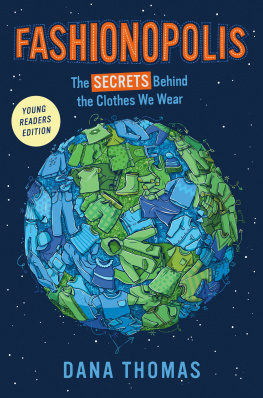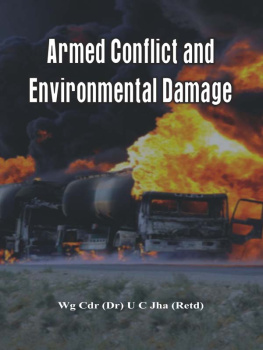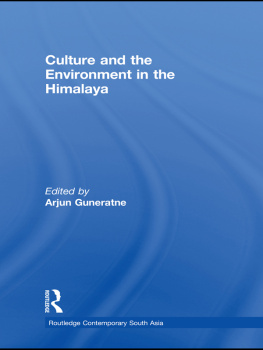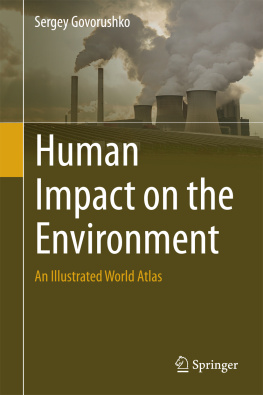The Environment
THE ENVIRONMENT
A History of the Idea
Paul Warde, Libby Robin, and Sverker Srlin

2018 Johns Hopkins University Press
All rights reserved. Published 2018
Printed in the United States of America on acid-free paper
9 8 7 6 5 4 3 2 1
Johns Hopkins University Press
2715 North Charles Street
Baltimore, Maryland 21218-4363
www.press.jhu.edu
Library of Congress Cataloging-in-Publication Data
Names: Warde, Paul, author. | Robin, Libby, 1956, author. | Srlin, Sverker, author.
Title: The environment : a history of the idea / Paul Warde, Libby Robin & Sverker Srlin.
Description: Baltimore, Maryland : Johns Hopkins University Press, 2018. | Includes bibliographical references and index.
Identifiers: LCCN 2018007462 | ISBN 9781421426792 (hardcover) | ISBN 9781421426808 (electronic) | ISBN 142142679X (hardcover) | ISBN 1421426803 (electronic)
Subjects: LCSH: Environmental sciencesPhilosophy. | Human ecology. | NatureEffect of human beings on. | BISAC: SCIENCE / History. | SCIENCE / Life Sciences / Ecology.
Classification: LCC GE40 .W37 2018 | DDC 304.2dc23
LC record available at https://lccn.loc.gov/2018007462
A catalog record for this book is available from the British Library.
Special discounts are available for bulk purchases of this book. For more information, please contact Special Sales at 410-516-6936 or .
Johns Hopkins University Press uses environmentally friendly book materials, including recycled text paper that is composed of at least 30 percent post-consumer waste, whenever possible.
Contents
Acknowledgments
This book was first conceived at the inaugural World Congress of Environmental History in Copenhagen in 2009. We three authors from the United Kingdom, Australia, and Sweden found ourselves talking about the idea of the environment and its history. The World Congress revealed that environmental history did not mean the same thing in different places. The environmental movement was central to some historical discussions; in others it was nearly absent. In the United States, environmental historians were historians whose work mapped the emergence of a social movement (called environmentalism since the 1970s, with various precursors). Elsewhere, environmental history included practitioners from a range of different disciplines: the environmentalism of the recent past was a subject for political science, while geographers and ecologists wrote about physical change over time, and historians wrote about the cultural history of these changes, and sometimes about Big Historythe stories of the planet from the big bang to the present.
The scales of environmental history were variable. Yet the idea of the environment itself has its own history, which emerged in most Western places in the postwar years, strengthening in the second half of the twentieth century. Led by public scientists, the environment was tied closely to managing natural resources and the land. The environment was a global idea, fostered by a universal science and growing in importance at the same time as globalization itself. The environment framed the idea of the global (especially the planetary) as much as the new globalism shaped the interdisciplinary sciences that came to call themselves environmental starting in the early 1960s.
We decided to write a book about this big idea, which by 2009 was already changing shape again with the proposal of a new epoch in Earths history, the Anthropocene. This was part of a project called Expertise for the Future, where we were especially interested in how discussions about the environment always seemed drawn toward its future fate, and how particular people had gained authority in those conversations. Our ideas were shaped and tested across a series of workshops held at the University of East Anglia in the United Kingdom, Harvard University, the Australian National University, and the Royal Institute of Technology in Stockholm. We would like to particularly thank all of the participants in those events for their papers, questions, reflections, and discussions that extended well beyond the events themselves. We would also like to thank all of those who helped us organize the meetings.
These represent only a part of our accumulated intellectual debts over a period of nine years. They include, directly and indirectly, the authors of the many books mentioned in the bibliographic essay and notes. We benefited greatly from the many helpful comments on interim presentations from this book at conferences of the American Society of Environmental History, the European Society for Environmental History, and the second World Congress of Environmental History (Guimares, Portugal, 2014), and in numerous other workshops and meetings. Financial and logistical support has come from the Centre for Environmental History, Australian National University; Center for History and Economics (Cambridge and Harvard); Division of the History of Science, Technology and Environment, Royal Institute of Technology (KTH), Stockholm, including its Environmental Humanities Laboratory; Fenner School of Environment and Society, Australian National University; Harvard University Center for the Environment; School of Social Science at the Institute for Advanced Study, Princeton, New Jersey; Peter Wall Institute for Advanced Studies, University of British Columbia; the IHOPE program (now at Uppsala University); Leverhulme Trust, UK; Rachel Carson Center for Environment and Society, Ludwig-Maximilians-University, Munich; Stockholm Resilience Center at Stockholm University; the University of East Anglia; Riksbankens Jubileumsfond (Stockholm); and FormasThe Swedish Research Council for Environment, Agricultural Sciences, and Spatial Planning. At every step of the way, we have enjoyed the intellectual stimulation and conviviality of the Ely Institute.
All told, our (friendly!) critical commentators over the years have been too many to list here. The few that nonetheless deserve to be mentioned by name are those who used some of their precious time to serve as chairs and commentators at conference panels, or read full chapters for us at their various stages of completion (including when they werent very complete at all), or commented on the structure of the project as a whole. These are Alison Bashford, Saul Cunningham, Tom Griffiths, Sabine Hhler, Sheila Jasanoff, Susanna Lidstrm, Gregg Mitman, Ed Russell, Anna Svensson, Jo Warde, Nina Wormbs, and Graeme Wynn.
The Environment
Prologue
The environment is all around us. This book asks the question, Where did it come from?
The environment is under threat as never before. Is it possible, we ask, for the economy to grow without the environment being destroyed? Will our lifestyles end up impoverishing the planet for our children and grandchildren?
Yet if we look back, within the lifetimes of many people alive today, such questions would have made no sense. This was not because we were having no impact on nature, nor because we were unaware of the fact of that impact. What we lacked was an idea: a way of imagining the web of interconnection and consequence of which the natural world is made. Without this, we also lacked a way to describe the scale and scope of human impact upon that world. This ideaa planet-changing idea, because it made the planet visible in a wholly new waywas the environment.
This is a book about how the idea of the environment came to be and its consequences. We begin this story in 1948, in the ferment of reconstruction and recrimination, in the hope of new global institutions and the fear of humans capacity for almost limitless destruction. It was at this moment that a new idea and a new narrative about the planet-wide impact of peoples behavior emerged. The environment provided a concept that linked changes close to home to worldwide pressures. At a time of a new world-mindedness, the environment became one of the concerns that nations sharedit was important for the raw resources that could create new peaceful societies. The conservation, restoration, and enhancement of the environment were part of international postwar reconstruction, and the environment shaped how many of the new global institutions developed.
Next page







